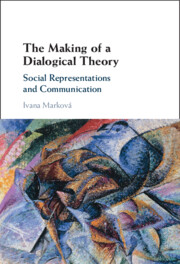Book contents
- The Making of a Dialogical Theory
- The Making of a Dialogical Theory
- Copyright page
- Contents
- Figures
- Acknowledgements
- Introduction
- Part I The Development and Diversification of the Theory of Social Representations and Communication
- Part II The Dialogical Perspective of the Theory of Social Representations and Communication
- Chapter 7 Social Representations and Common Sense
- Chapter 8 Meanings and Knowledge as Semiotic Processes
- Chapter 9 They ‘Made Flowers Grow Where It Seemed Impossible’
- Chapter 10 Social Representations as Unique Phenomena:
- Chapter 11 The Making of Dialogical Theories
- Afterword
- References
- Index
Chapter 7 - Social Representations and Common Sense
from Part II - The Dialogical Perspective of the Theory of Social Representations and Communication
Published online by Cambridge University Press: 22 June 2023
- The Making of a Dialogical Theory
- The Making of a Dialogical Theory
- Copyright page
- Contents
- Figures
- Acknowledgements
- Introduction
- Part I The Development and Diversification of the Theory of Social Representations and Communication
- Part II The Dialogical Perspective of the Theory of Social Representations and Communication
- Chapter 7 Social Representations and Common Sense
- Chapter 8 Meanings and Knowledge as Semiotic Processes
- Chapter 9 They ‘Made Flowers Grow Where It Seemed Impossible’
- Chapter 10 Social Representations as Unique Phenomena:
- Chapter 11 The Making of Dialogical Theories
- Afterword
- References
- Index
Summary
7. In daily life, common sense refers to established uniformities of a physical, biological, and social nature, and it is usually assumed to be self-evident. Humans sense such uniformities as constancies passed on over generations, and common sense is an implicit and normative guidance for daily acting.
In this chapter, I have shown that the relations between common sense and social representations are complex and manifold, and one cannot substitute one phenomenon for the other. I insisted that relations between common sense and social representations are different in the broad and narrow perspectives of social representations.
In the broad perspective, Moscovici distinguished between two forms of common-sense knowledge: historically, first-hand common-sense knowledge generates scientific knowledge. It is based on traditions and consensus, comprising daily thinking and language, images, and metaphors. Second-hand common-sense knowledge results from the transformation of scientific knowledge into daily knowledge.
In the narrow perspective, I suggest that Moscovici was not primarily concerned with rationality of common sense but with reversals of unconscious into conscious beliefs and knowledge, and vice versa, in the formation and transformation of social representations of specific phenomena. I identify two sources of such reversals: the unconscious (and non-conscious) and themata.
- Type
- Chapter
- Information
- The Making of a Dialogical TheorySocial Representations and Communication, pp. 153 - 177Publisher: Cambridge University PressPrint publication year: 2023



